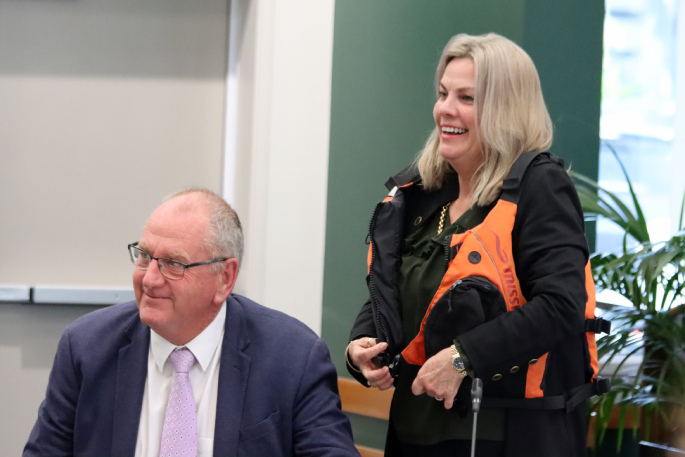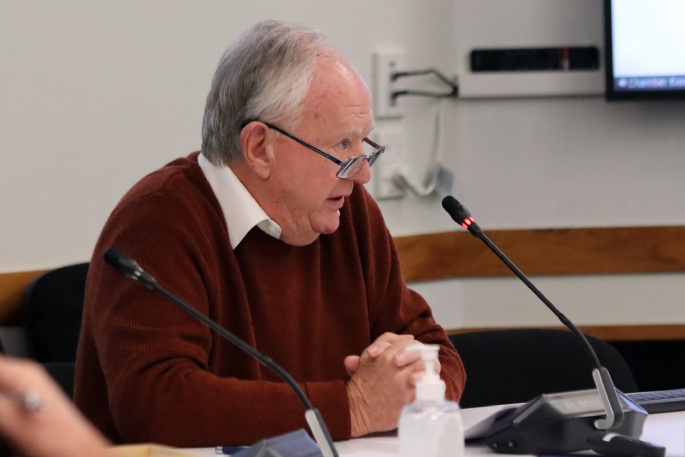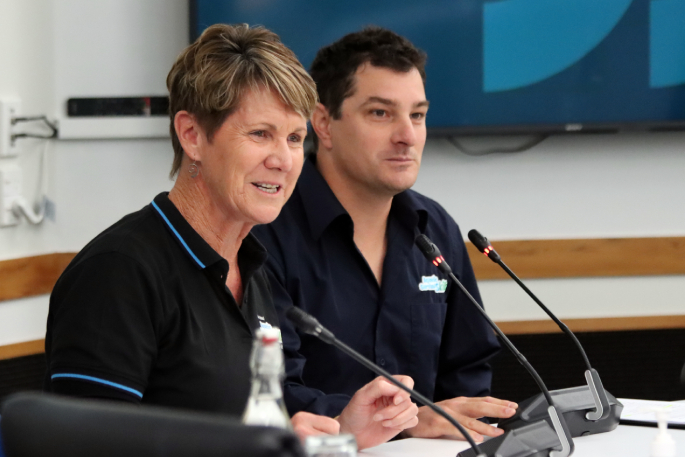The race was on as Western Bay councillors scrambled to don their life jacket first.
The challenge was set by Aquatic Survival Skills, an organisation seeking funding from the council through its 10-year plan.
Aquatic Survival Skills board member Alison Wieringa says their organisation teaches children and teachers basic water safety skills in the Western Bay of Plenty.
The current programme was for children in year 5 and 6, but they hoped to expand, Alison says during the council’s long-term plan hearings last week.
“Extending into more and all the schools through the greater Bay of Plenty region is crucial.
“Schools have changed their priorities over the past 20 plus years. Many schools now don't have a school pool.”
Since the programme began in 2021, Aquatic Survival Skills had reached 6000 students and 250 teachers, she says.
Aquatic Survival Skills was seeking $180,000 from the Western Bay of Plenty District Council over three years and had also approached Tauranga City Council and Bay of Plenty Regional Council, says Alison.
Film Bay of Plenty was asking for $304,500 over three years for operating costs and to help set up an incentive fund to attract screen productions to film in the area.
Filming in the regions was a “tad more expensive” than the main centres, so an incentive was needed to attract productions, says Film Bay of Plenty manager Jade Kent.
The Lord of the Rings movies had made Matamata a tourist destination, which showed that a film can have a long-lasting financial effect for a community, she says.
The organisation’s goal was to have all councils in the Bay of Plenty adding to the incentive, says Jade.
Western Bay council already provided around $18,000 a year to Film Bay of Plenty for operating costs, Jade told Local Democracy Reporting after the meeting.
 Western Bay councillors Don Thwaites and Tracey Coxhead taking part in a life jacket challenge. Photo: Alisha Evans/SunLive.
Western Bay councillors Don Thwaites and Tracey Coxhead taking part in a life jacket challenge. Photo: Alisha Evans/SunLive.
Rates was also another hot topic at the hearings with ratepayer associations and community boards airing their concerns about rates affordability.
The council has proposed increases of 13.6 per cent and 10.44 per cent in the first two years. For the remaining years the increases would be between 7 per cent and 8.46 per cent.
Ōmokoroa Community Board member Allan Hughes says he was speaking on his own behalf.
The proposed rates increases were “too high” and left a “widening gap” between the cost of services and people’s ability to pay, he says.
“I believe the council needs to go back to basics, review infrastructure and core services and not get too focused on the nice to haves.”
Katikati community board chairperson John Clements says the board surveyed the community and held a workshop to explore the long-term impacts of the plan.
 Katikati community board chairperson John Clements. Photo: Alisha Evans/SunLive.
Katikati community board chairperson John Clements. Photo: Alisha Evans/SunLive.
The community and community board were “extremely concerned with the high increases”, says John.
“These increases have both a social and economic impact on the town.”
The proposed roading rate for commercial and industrial properties, which would be four times that of a residential property, should be split so commercial properties paid less than industrial, he says.
This was because commercial properties didn’t have heavy industrial trucks parked outside which “tear up the road” more than other vehicles, says John.
Representatives from the Ōmokoroa Residents and Ratepayers Association, Katikati Waihī Beach Residents and Ratepayers Association and the Waihī Beach Community Board also addressed the rates increases.
When adopting the draft long-term plan for consultation in May, mayor James Denyer says the 13.6 per cent increase was lower than the 15 per cent average increase for councils around the country.
Twenty-three organisations and individuals spoke at the hearings. Deliberations will take place before the final long-term plan is adopted in late September.
LDR is local body journalism co-funded by RNZ and NZ On Air.




1 comment
All the Eights
Posted on 06-07-2024 16:30 | By FreddyN
The 13.6% rates increase might be slightly lower than the NZ average percent increase but WBOPDC rates last year were the eighth highest in NZ. So in dollar terms it is a very big increase. Residential rates in WBOPDC will double within eight years.
It is now eight weeks since WBOPDC approved the Draft Long Term Plan but the minutes of that meeting have still not been published. What are they hiding?
Leave a Comment
You must be logged in to make a comment.